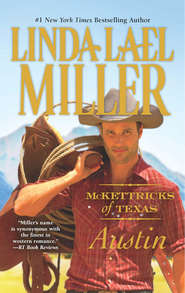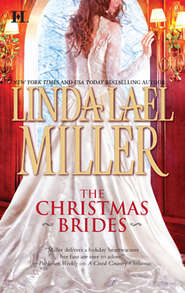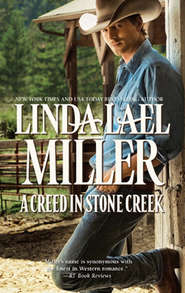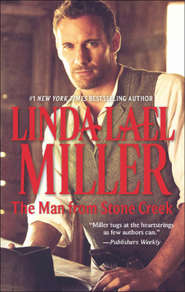По всем вопросам обращайтесь на: info@litportal.ru
(©) 2003-2024.
✖
A McKettrick Christmas
Автор
Год написания книги
2019
Настройки чтения
Размер шрифта
Высота строк
Поля
“Let’s get back to the others,” Morgan said quietly. “There’s nothing more we can do here.”
Their progress was slow and arduous, but when they returned to the other car, someone had lighted lanterns, and the place had a reassuring glow. Most of the passengers seemed to have regained their composure. Even Woodrow had ceased his fussing; he peered alertly through the bars of his cage, his snow-white feathers smooth.
Whitley had emptied his flask and either passed out or gone to sleep, snoring loudly, clinging possessively to his blanket even in a state of unconsciousness.
“I’d better take a look at him,” Morgan said ruefully, stopping by Whitley’s seat and opening his kit, pulling a stethoscope from inside. “My preliminary diagnosis is pampering by an overprotective mother or a bevy of fussy aunts or spinster sisters, complicated by a fondness for strong spirits. I’ve been wrong before, though.” But not very often, he might have added, if his tone was anything to go by.
Lizzie could not decide whether she liked this man or not. He certainly wasn’t one to remain on the sidelines in a crisis, which was a point in his favor, but there was a suggestion of impatient arrogance about him, too. Clearly, he did not suffer fools lightly.
She approached the Halifax family and found them still burrowed down in the faded quilt. The peddler had lighted another cigar, and the soldier was on his feet, trying to see out into the night. Darkness, snow and the reflected light of the lanterns on the window glass made it pretty much impossible, but Lizzie understood his need to be doing something.
“Some Christmas this is going to be,” he said, turning when Lizzie came to thank him for giving up his quilt to Mrs. Halifax and her little ones. “Nothing to eat, and it’ll get colder and colder in here, you’ll see.”
“We’ll need to keep our spirits up,” Lizzie replied. “And expect the best.” Lorelei said things generally turned out the way folks expected them to, Lizzie recalled, so it was important to maintain an optimistic state of mind.
“Reckon we ought to do both them things,” the soldier said, his narrow, good-natured and plain face earnest as he regarded Lizzie. “But it wouldn’t hurt to prepare for some rough times, either.” He smiled, put out a hand. “John Brennan, private first class, United States Army,” he said.
“Lizzie McKettrick,” Lizzie replied, accepting the handshake. His palm and fingers felt dry and hot against her skin. Did he have a fever? “Do you live in Indian Rock, Mr. Brennan? I grew up on the Triple M, and I don’t think I’ve ever seen you before.”
“My wife’s folks opened a mercantile there, six months ago. I was in an army hospital, back in Maryland, laid up with typhoid fever and the damage it done, for most of a year, so my Alice took our little boy and moved in with her mama and daddy to wait for my discharge.” Sadness flickered in his eyes. “Reckon my boy’s all het up about it bein’ almost Christmas and all, and lookin’ for me to walk through the front door any minute now.”
Lizzie sat down in the aisle seat, and John Brennan lowered himself back into the one beside the window. Lorelei had written her about the new mercantile, pleased that they carried a selection of fine watercolors and good paper, among other luxuries, along with the usual coffee, dungarees, nails and tobacco products. “What’s your boy’s name?” she asked, “And how old is he?”
“He’s called Tad, for his grandpappy,” Mr. Brennan said proudly. “He turned four last Thursday. I was hoping to be home in time for the cake and candles, but my discharge papers didn’t come through in time.”
Lizzie smiled, thinking of her younger brothers. They’d be excited about Christmas, and probably watching the road for their big sister, even though they’d surely been told she’d arrive tomorrow. She consulted the watch pinned to her bodice; it was almost three o’clock. The train wasn’t due in Indian Rock until six-fifteen.
She imagined her grandfather waiting impatiently in the small depot, right on time, hectoring the ticket clerk for news, ranting that in his day, everybody traveled by stagecoach, and by God, the coaches had been a hell of a lot more reliable than the railroad.
Shyly, John Brennan patted her hand. “I guess you’ve got home-folks waitin’, too,” he said.
Lizzie nodded. “Will you be working at the mercantile?” she asked, just to keep the conversation going. It was a lot less lonely that way. And a lot easier than thinking about the very real possibility of another avalanche, sending the whole train toppling over the cliff.
“Much as I’m able,” Mr. Brennan replied. “Can’t do any of the heavy work, loading and unloading freight wagons and such, but I’ve got me a head for figures. I can balance the books and keep track of the inventory.”
“I’ll be teaching at Indian Rock School when it reopens after New Year’s,” she said.
Mr. Brennan beamed. He was one of those homely people who turn handsome when they smile. “In a couple of years, you’ll have my Tad in first grade,” he said. “Me and Alice, we place great store by book learnin’ and such. Never got much of it myself, as you can probably tell by listenin’ to me talk, but I learnt some arithmetic in the army. Tad, now, he’ll go to school and make something of himself.”
Lizzie remembered how Mr. Brennan had given his quilt to Mrs. Halifax, even though he was obviously susceptible to the cold. He’d wasted during his confinement, so that his uniform hung on his frame, and plans to help out at the mercantile or no, he might be a semi-invalid for a long time.
“If Tad is anything like his father,” she said, “he’ll do just fine.”
Brennan flushed with modest pleasure. Sobered when he glanced toward the front of the train, where Whitley was awake again and complaining to Dr. Shane, who looked as though he’d like to throttle him. “Is that your brother?” he asked.
“Just someone I knew in San Francisco,” Lizzie said, suddenly sad. The Whitley she’d thought she’d known so well had been replaced by a petulant impostor. She grieved for the man she’d imagined him to be—the young engineer, with great plans to build dams and bridges, the cavalier suitor with the fetching smile.
Morgan left Whitley and came back down the aisle. “I’m going out and have a look around,” he said, addressing John Brennan instead of Lizzie. “If I don’t come back, don’t come searching for me.”
Lizzie stood up. “You can’t go out there alone,” she protested.
Morgan laid his hands on her shoulders and pressed her back into the hard, soot-blackened seat. “Mrs. Halifax might need you,” he said. “Or the children. Or the old folks—the husband has a bluish tinge around his lips, and I’m worried about his heart.” He paused, nodded toward Whitley. “God knows, that sniveling yahoo up there in the blanket won’t be any help.”
The peddler opened his sample case again, brought out a pint of whiskey, offered it to Morgan. “You may have need of this,” he said. “It’s mighty cold out there.”
Morgan took the bottle, put it in the inside pocket of his coat. “Thanks.”
“At least take one of the lanterns,” Lizzie said, anxious wings fluttering in her stomach, as though she’d swallowed a miniature version of Woodrow.
“I’ll do that,” Morgan answered.
“Here’s my hat,” Mr. Brennan said, holding out his army cap. “It ain’t much, but it’s better than going bareheaded.”
“I have a scarf,” Lizzie fretted. “It’s in my handbag—”
Morgan donned the cap. It looked incongruous indeed, with his worn-out suit, but it covered the tops of his ears. “I’ll be fine,” he insisted. He went back up the aisle, leaving his medical kit behind, and out through the door at the other end.
Lizzie watched for the glow of his lantern through the window, found it, lost track of it again. Her heart sank. Suppose he never came back? There were so many things that could happen out there in the frigid darkness, so full of the furious blizzard.
“I don’t think your interest in the good doctor is entirely proper,” a familiar voice said.
Lizzie looked up, mildly startled, and saw Whitley standing unsteadily in the aisle, glowering down at her. His cheeks were flushed, his eyes glazed.
“Be quiet,” she said.
“We have an understanding, you and I,” Whitley reminded her.
“I quite understand you, Whitley,” Lizzie retorted, “but I don’t think the reverse is true. Unless you mean to make yourself useful in some way, I’d rather you left me alone.”
Whitley was just forming his reply when the whole car shuddered again, listed slightly cliffward, and caught. The peddler shouted a curse. Mr. Brennan launched into the Lord’s Prayer. Mrs. Halifax gave a soblike gasp, and her children shrieked in chorus. Woodrow squawked and sidestepped along his perch, and the elderly couple clung to each other.
“We’re all right,” Lizzie said, surprising herself by how serenely she spoke. Inside, she was terrified. “Nobody move.”
“Seems to me,” observed the peddler, having recovered a modicum of composure, “that we’d all better sit on the other side of the car.”
“Good idea,” Lizzie agreed.
Whitley took a seat very slowly, his face a ghastly white. Lizzie, the peddler, and John Brennan crossed the aisle carefully to settle in. So did the old folks and Woodrow.
Outside, the wind howled, and Lizzie thought she could feel the heartbeat of the looming mountain itself, ponderous and utterly impersonal.
Where was Morgan Shane?
Lost in the impenetrable snow? Buried under it?
Fallen into one of the treacherous crevasses for which the high country was well known?
Lizzie wanted to cry, but she knew it was an indulgence she couldn’t afford. So she cleared her throat and began to sing, in a soft, tremulous voice, “‘God rest ye merry gentlemen, let nothing you dismay…’”











